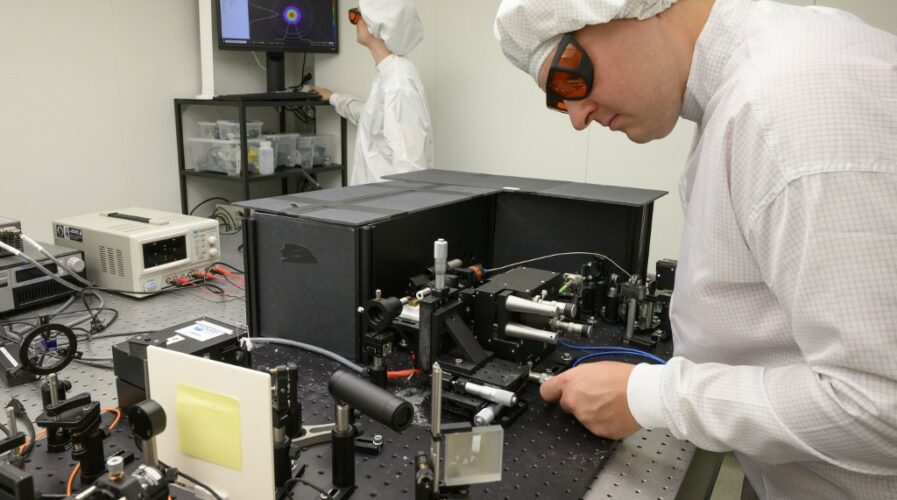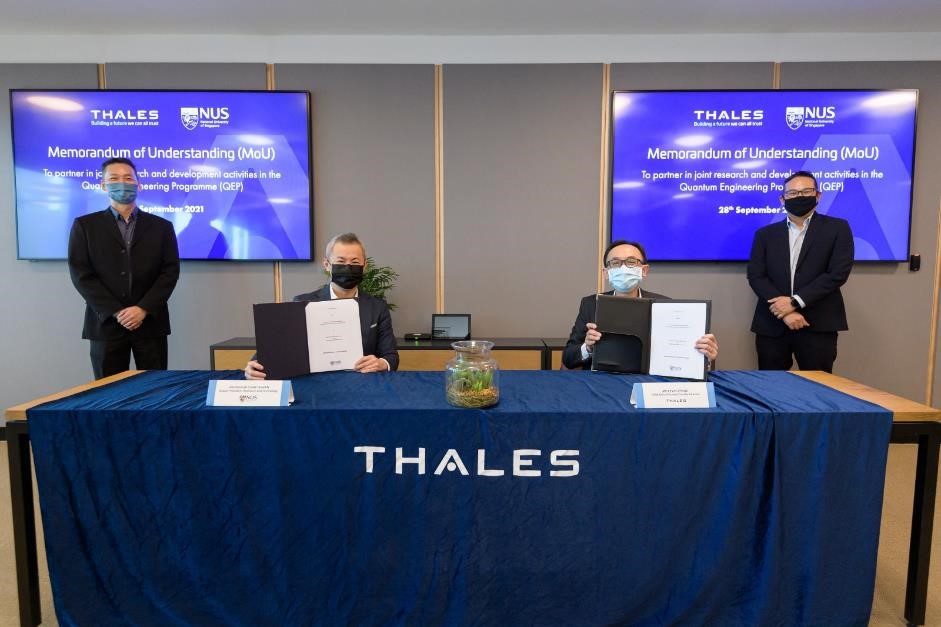
An engineer adjusts a laser to test chips with waveguides for quantum computing. (Photo by THOMAS KIENZLE / AFP)
Singapore’s NUS and Thales developing quantum technologies for commercial applications
Quantum computing applications may not be particularly mainstream now, although quantum computing as a field has been growing at an accelerated rate these past few years.
While the frequently-bandied about term may sound intimidating, quantum computing is essentially computing that can be performed at speeds and efficiencies far, far superior to what typical computers can do today. In short — computing on steroids.
Aside from university labs, we’re already seeing it being used in a few sectors, such as cybersecurity, pharmaceuticals, and even logistics. Indeed, quantum computing has come a rather long way, in a short amount of time, mainly because of the immense benefit it can give to quickly compute and thus, analyze massive sets of data at breakneck speeds.
The rise of quantum computing has Big Tech to thank — giants such as Microsoft, Amazon, Google, and IBM have been heavily investing in developing quantum computing and related technologies in recent years. The same has gone for governments such as China, South Korea, India, and Japan, all of whom have invested in or are planning to invest in developing this technology.
Just last month, UK-based Oxford Quantum Circuits launched the world’s first commercially available QCaaS (Quantum Computing as a Service), even. Prior to OQC, both Amazon and Honeywell had worked on developing and piloting commercial QCaaS.
Industrial quantum computing applications
Earlier this week, the National University of Singapore’s (NUS) Singapore’s Quantum Engineering Programme (QEP) announced that they would be working with Thales to develop and test quantum technologies for industry use.
The Memorandum of Understanding (MoU) signed on 29 September marks the start of a two-year partnership to jointly develop and test quantum technologies for commercial applications.

A Memorandum of Understanding was inked by (front row, from left) Professor Chen Tsuhan, Deputy President (Research and Technology), National University of Singapore, and Mr Kevin Chow, Country Director and Chief Executive, Thales in Singapore. The signing was witnessed by (back row, from left) Mr Ling Keok Tong, Director (Smart Nation and Digital Economy), National Research Foundation, Singapore, and Mr Chen Guan Yow, Vice President and Head (New Businesses), Economic Development Board. (IMG/Thales)
Under the MoU, Singapore’s Quantum Engineering Programme (QEP) and Thales aim to advance quantum technologies and prepare industry players for their arrival. The partnership will see industry and academic experts from Thales and QEP develop capabilities to test and evaluate interdisciplinary quantum security technologies.
They will also explore potential research collaboration opportunities in the fields of new materials and design for quantum sensing. Additionally, they will organise joint activities such as seminars and conferences to share their expertise and showcase their research outcomes.
Singapore’s quantum computing aspirations
The Quantum Engineering Programme (QEP) is an initiative launched in 2018 by the National Research Foundation, Singapore (NRF) and hosted at NUS. The projects under the collaboration span technologies for security and sensing, and involve QEP researchers across Singapore’s institutes of higher learning and research centres.
Professor Chen Tsuhan, NUS Deputy President (Research & Technology), said, “Building on this momentum, QEP’s partnership with Thales, a forerunner in the quantum revolution, will accelerate innovation and development of quantum solutions that are commercially attractive locally and globally.”
With its track record in developing security and cybersecurity equipment, Thales will make available its SafeNet Luna Hardware Security Modules (HSMs) and high-speed network encryptors that support interfaces to quantum devices for research use.
The algorithms and quantum random number generation technology in these types of equipment provide the crypto-agility to easily implement quantum-safe crypto and combat the threats of quantum computing. This equipment would be deployed for proof-of-concept trials and testbeds in Singapore.
Preempting future quantum threats
In May 2021, Thales launched a network encryption solution capable of protecting enterprise data from future quantum cyber-attacks. It supplements standard encryption with a scheme resistant to quantum computing that is under consideration for international standards.
“Quantum technologies open almost infinite possibilities for the future and our researchers see real potential in three types of quantum applications, namely in sensors, communications and post-quantum cryptology”, shared Mr Kevin Chow, Country Director and Chief Executive, Thales in Singapore.
Thales, which has 33,000 engineers across the world, also aims to be a key player in what is often called the second quantum revolution, which exploits subtle properties of quantum physics and requires mastery of the associated technologies.
Aside from industrial quantum computing applications, what’s next?
Thales’ collaboration with QEP is a “strong testament” to the company’s approach towards using quantum technologies to solve real-world, end-user challenges.
According to Chow, while this initial partnership will involve their network encryption technology to provide crypto-agility and cybersecurity, Thales will continue to work with the R&T ecosystem in Singapore to explore new topics, including using novel materials for quantum sensing or in secured communications in quantum technologies.
Additionally, the joint team of scientists and engineers will also develop devices that tap on quantum physics for higher performance. According to QEP, this is an area of focus under Singapore’s Research, Innovation and Enterprise 2025 Plan (RIE2025).
Mr Ling Keok Tong, Director (Smart Nation and Digital Economy) at NRF shared that quantum communications and security, as well as quantum devices and instrumentation, are two significant focus areas under the QEP.
READ MORE
- Ethical AI: The renewed importance of safeguarding data and customer privacy in Generative AI applications
- How Japan balances AI-driven opportunities with cybersecurity needs
- Deploying SASE: Benchmarking your approach
- Insurance everywhere all at once: the digital transformation of the APAC insurance industry
- Google parent Alphabet eyes HubSpot: A potential acquisition shaping the future of CRM


